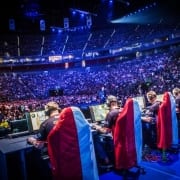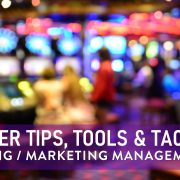IT’S GETTING TOUGHER TO FIND AND KEEP FRONTLINE GAMING STAFF – SO WHAT’S CHANGED
Twenty years ago the role of front line staff in a club or hotel involved many more hands on practical skills than it does today. There were coins in machines, and later notes, which would get jammed often. They could end up in several places throughout a machine, from the cash box to the hopper to the note acceptors and sometimes just in the machine. We had to fill out paperwork for payouts and even calculate the credits in a dollar amounts. We had to key off credits to complete payments. We had to walk the floor without pagers to chat to players and take drink orders. There was a great deal of interaction with customers and the job was fun!
With the introduction of better technology that rarely sees errors, removal of coins, automatic credit drops to win meters, TITO tickets, cashless cards, and pagers that focus on speed of service, the role of gaming staff has become quite boring. Staff are reduced to coffee and drink service.
Additionally most clubs these days have reduced the number of senior managers. There used to be the CEO, financial controller, gaming manager, marketing manager, promotions manager, beverage manager, facilities manager, HR/training manager and operations manager. These days, with increased technology and a requirement to reduce costs, often managers are holding down a couple of these roles in one job, with a reduced number of Duty Managers and Supervisors assisting operational requirements at the club.
These changes have led to two main problems:
1. The role of front line staff is not as interesting as it was before, and
2. Staff no longer see an obvious progression into more responsibility so they no longer see working in clubs/hotels as a career opportunity.
Resolving these issues requires a different vision:
Add responsibility to the role – from straw-poling customers about venue services (do we have the right food, drinks) to assisting with promotional queries (are we running them at the right time, day, prize amounts), there are a million small reports that floor staff can prepare that will make a managers’ life easier. Checking on paging service times and ensuring staff are rewarded for exceptional work is definitely an operational issue they can manage effectively. Give them a portfolio to look after and take responsibility for with your guidance (eg VIP host, gaming floor promotions). When staff are empowered to look after the operational things, as the manager, you will then have the time for the strategic ones.
Communicate the goal posts – many front line staff aren’t aware of what the goal posts are in a venue. There are always budgets for expenditure, targets for waste reduction and forecasts for gaming turnover but often the front line staff don’t know what these are. There are many instances where some components can be published to the team so that they understand better where they can help by improving results and keeping problem areas front of mind. This can be tracked month to month so they can see how their efforts are helping.
Career progression – without a vision of what role they may be able to achieve over the years it is hard to retain good potential managers. They will gain experience, learn what they can and move on. Obviously no one expects good managers to leave just to make room for younger managers, but there are definitely ways to ensure these staff are engaged. Identify high-performing employees and give them additional training or send them to local and international conferences to increase networking opportunities, skills and knowledge. Ultimately they will be an advantage to your business and remain loyal and engaged.
By: Justine Channing – Gaming Specialist, The Drop













